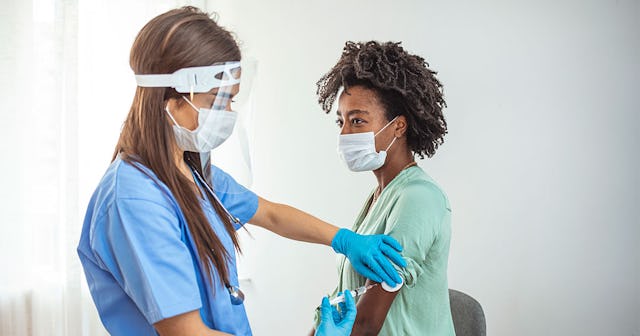If You Haven’t Gotten Your 12- To 17-Year-Old Their COVID Vaccine, What Are You Waiting For?

The Pfizer COVID vaccine was approved for kids aged 12-17 on May 10th of this year. Three days later, on the first day my state made the vaccine available to that age group, my 14-year-old son received his first shot. It was a day of major celebration in our household.
Clearly, I didn’t have any hesitations about my son getting vaccinated. My husband and I had already gotten the shots, I felt comfortable with the safety data I’d read, and I felt that getting the vaccine was important for my son. He has asthma and I had kept him fairly locked down for a year. His vaccine meant freedom for him, and I viewed it as an important measure to keep our family and our community safe.
Although I understand why some parents may have felt reluctant to jump right the minute the shot were approved for teens, I was pretty shocked when I learned that only 7.1 million kids have been fully vaccinated against COVID as of July 28th. According to the Academy of American Pediatrics (AAP), 28% of 12-15 year-olds are fully vaccinated, and only 40% of 16-17 year-olds have gotten both shots.
To put it another way, 72% of kids aged 12-15 have not been fully vaccinated. And neither have 60% of 16-17 year-olds.
Folks, this is not good. Not good at all. Especially with school starting up. Especially with Delta at play. We need as many kids vaccinated as are eligible. Being vaccinated offers protection on an individual basis, but it also protects the people around you, and your community at large.
So, we’re talking about protecting students in schools who are not eligible to be vaccinated yet. (For example, at a middle school, there are many 11-year-olds who are not eligible, so the older kids being vaccinated protects them.) We’re talking about protecting teachers and staff who may be older or immunocompromised and for whom the vaccine doesn’t offer full protection.
We’re talking about decreasing the chances of your tween or teen bringing the virus home and spreading it to vulnerable family members. I have an unvaccinated kid at home, and protecting him is a major reason I got my teen vaccinated.
The Washington Post interviewed parents who are still reluctant to get their teen vaccinated. They cited reasons that included the fact that the vaccine hasn’t been tested in teens for long periods, concerns about side effects (especially myocarditis), and the fact that teens usually have milder cases of COVID.
Here’s the thing, though. I get why parents feel anxious. We only want the best for our kids, and I think all parents are coming from that place. But many of the fears about the vaccines come from places of misinformation.
If we take the issue of side effects, we see that the chances of something actually serious or deadly happening to your teen is almost nil. As Dr. Katelyn Jetelina of Your Local Epidemiologist points out, there’s already tons of data out about the potential side effects in teens, as reported to V-Safe, the CDC’s post-vaccination surveillance program.
“Since December, 129,059 adolescents enrolled in the v-safe program (66,350 aged 16–17; 62,709 aged 12-15),” Dr. Jetelina explained. Of those, 49-56% had side effects after the first dose, and 63-70% had side effects after their second jab. All the side effects were similar to the ones adults had: sore arms, exhaustion, headaches, fevers.
Only 0.5-0.8% required medical care after their vaccines, and 0.02-0.04 required hospitalization. In the case of hospitalization, it’s unknown if these instances had anything to do with the shot.
Okay, and what about myocarditis, the inflammatory heart condition that was reported to be linked to the vaccine in adolescents? As Dr. Jetelina notes, there have been a total of 147 cases of myocarditis in 12-17 year-olds who’ve gotten the shot. All cases have responded well to treatment and no deaths have been reported as a result so far.
Here’s the most important part: You are much more likely to suffer heart problems from getting COVID, not from the vaccines.
“We see that these adverse events are leading to very short and unremarkable hospital stays,” Dr. Jeremy Faust, an emergency medicine physician at Brigham and Women’s Hospital in Boston, told The New York Times. “The same can’t be said of hospitalizations for Covid-19 in this or any age group so far.”
“When people are hospitalized for Covid, the consequences are far more severe,” Dr. Faust said.
That’s probably the bottom line here. COVID is real. It’s bad. It’s not something you want your kid to get. Yes, COVID can be mild in kids. But severe cases do happen. Kids can get long COVID. And kids can die of COVID. In fact, over 400 kids have died of COVID since the pandemic began.
As Dr. Rochelle Walensky, CDC director said, 400 kids are not supposed to die of a respiratory disease. That’s not acceptable to me, and it shouldn’t be acceptable to you.
But there’s a simple, easy solution to this problem: vaccines. They are safe, effective, they will keep your 12-17 year-olds out of the hospital should they pick up the virus. And they are important measures for us to safely open schools and finally kick this pandemic to the curb.
We all need to do our part, and that includes vaccinating our eligible kids.
This article was originally published on